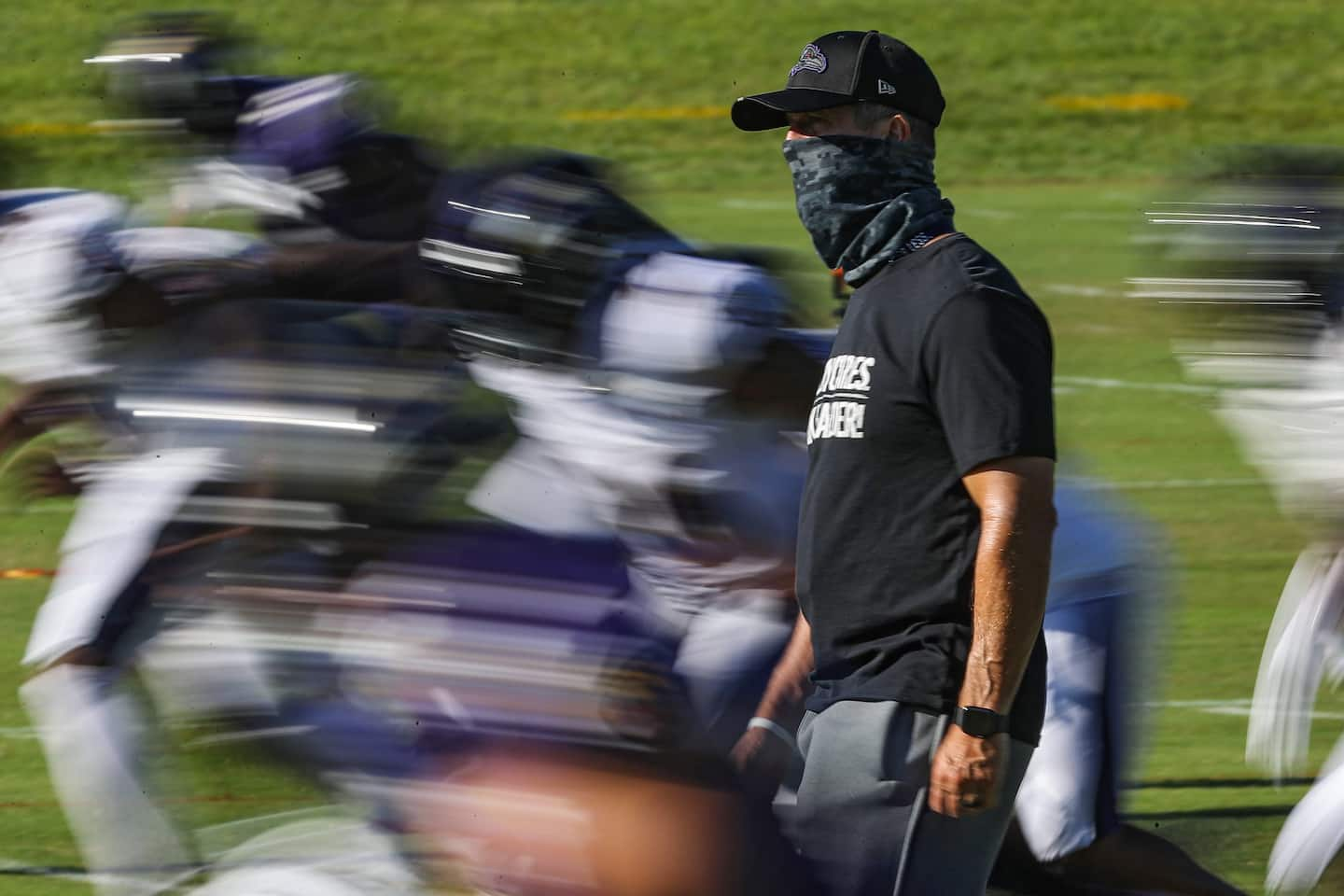The thoughtless husks who plunged this NFL season into chaos deserve a public shaming

They’re easy to spot, zombies: They’re the un-sentient, disconnected husks who walk around breathing potential hell on their colleagues and neighbors. They lurch clumsily into the midst of crowded rooms with their masks either missing or dragging around their chins, spreading their odorless danger mercilessly as they shout. Steve Saunders, strength coach of the Ravens? Clearly a zombie. Denver Broncos quarterbacks Drew Lock, Blake Bortles, Brett Rypien and Jeff Driskel are a whole cohort of zombies, mobile in body but empty-skulled, lax and evidently less than cooperative about their contacts. See, one thing about zombies is that they are not just unthinking. They are aggressively unthinking.
The thing to do when you see a zombie is scream — scream their names out loud. It’s unclear whether this can stop a zombie, because they are such inherently sightless, deaf, selfish and oblivious organisms: Saunders reportedly went to work with symptoms and left fevered handprints all over the Ravens’ facility, and now the infections are at 30 people, from quarterback Lamar Jackson to a nutritionist. Perhaps loud public shaming might at least give the zombies pause, long enough for folks to run in the other direction.
As Pittsburgh Steelers cornerback Joe Haden tweeted last week: “They always got our names blasted across the TV screen when we break the rules! Put a face on it.”
There has been evidence of zombie-like incursion into the NFL’s main office in the Park Avenue headquarters, despite all those hermetic doors that make a hissing noise. The league’s determination to make the Ravens and the Pittsburgh Steelers play on a Wednesday at 3:40 p.m., after three postponements, is purely unsettling. There is something about it that feels forced, involuntary, creepily so. It’s as though league officials mistake frenzied activity for winning against the virus. But then, they just reflect their audience in that.
Because zombie-ism is not restricted to those teams or solely to the NFL. There are signs of zombification in lots of Americans lately. They may come on as rugged individualists, but the giveaway is they’re always in shambling mobs looking for something to eat.
Speaking of zombie meals, the San Francisco 49ers should beware of eating in Arizona, where they will now be playing because virus hospitalizations at home have tripled in a month. The 49ers would do well to avoid Phoenix-area restaurants like Houston’s and Bandera, because they’re owned by the Hillstone Group, which appears to be run entirely by zombies. Back in May, the company’s vacant-minded managers directed staffers not to wear face masks, to the point that a Dallas-based employee had to sue for the right to don protective gear at work. A local Arizona coronavirus model now predicts a new viral surge will be “a major forest fire without an evacuation order” unless the state mandates masking. Hillstone’s restaurants are reluctant to enforce masks — but they forbid guests from wearing hats, tank tops, flip flops and team athletic attire.
Another thing about zombies is they tend to be super belligerent, yet they howl with outrage at any act that might impede them, and they are highly evasive. Saunders of the Ravens and the four Broncos quarterbacks reportedly ditched their league-issued tracking devices, making it harder to trace infections. For the Ravens, that meant nine straight days of positive tests across the Thanksgiving holiday. Defensive end Calais Campbell, who has asthma, got sick enough to tweet: “This virus is brutal! I pray no one else has to go through this.”
But then, a classic hallmark of zombies is that they are unaffected by injuries to themselves or to others. They’re unmoved by cases like those of Jacksonville Jaguars running back Ryquell Armstead, who is just 24 yet has been hospitalized twice with covid-related breathing issues, and 25-year-old Buffalo Bills tight end Tommy Sweeney, who developed myocarditis. Zombies, as we know, are highly unemotional and unimaginative, so they are incapable of projecting themselves into a hospital bed. The zombies inside the locker rooms suppose themselves pre-inoculated by their physical superiority and their privileged habitations, fortified by private laboratory tests.
Maybe the scariest thing of all about zombies is their vacancy. They have a blank recklessness, with their assumption that no plague can touch them, and it matters not the least if it touches others. If there is a meaning to the zombie metaphor in all those horror films, it’s about a moral void in a culture gone badly wrong with carelessness.
Zombies don’t have to be bat-bitten, red-eyed raveners, sinister and recomposed. They can be stalkers, sleepers. Perfectly normal-seeming executives, colleagues, neighbors. And they can be real. The only tell is their utter smugness as they stare through evidence of exponential infections, ICUs at capacity and skyrocketing death rates, and yet blithely go on trying to colonize your lungs. Don’t just avoid them. Call them out, so others can see them.






